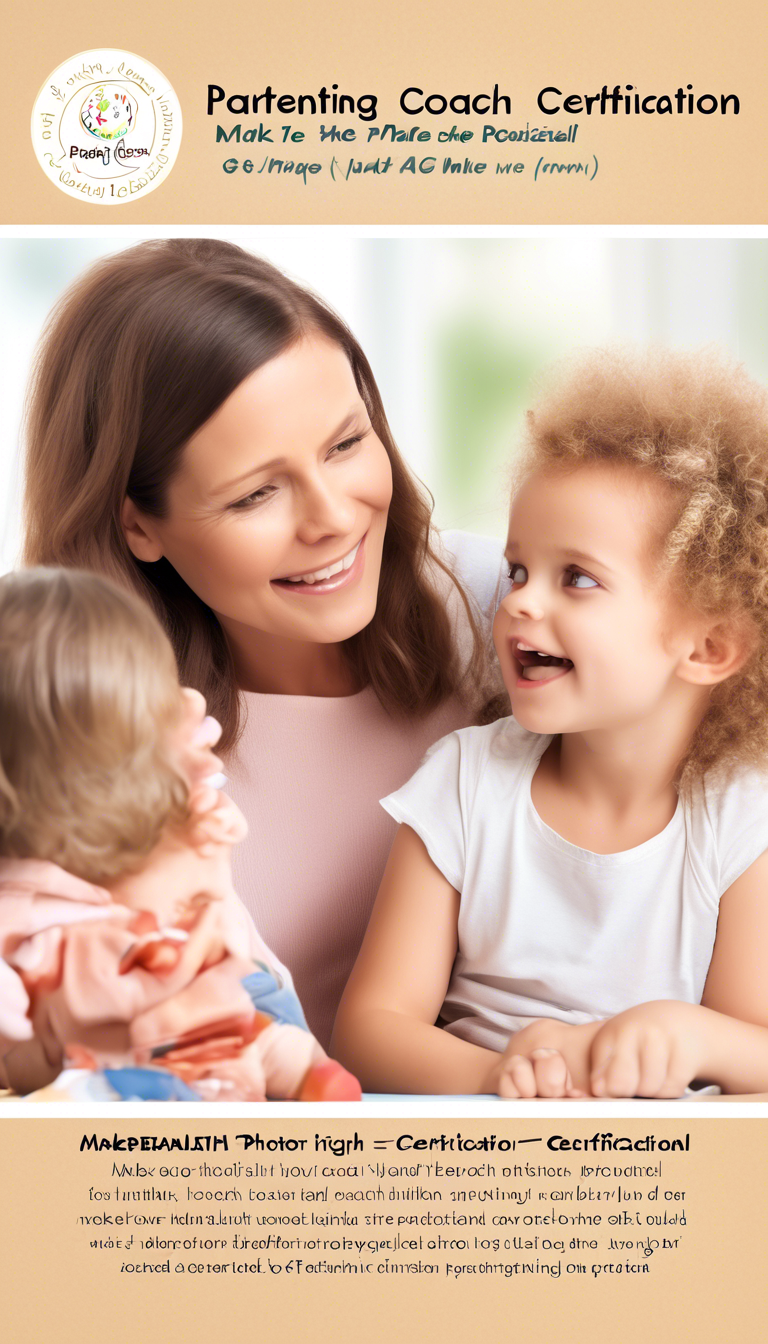The Importance of Parenting Coach Certification in Contemporary Family Dynamics
In today’s rapidly evolving family dynamics, the role of a parenting coach has become increasingly essential. As families face unique challenges fueled by technology, social pressures, and diverse values, maintaining a harmonious home environment requires expert guidance. This is where parenting coach certification plays a crucial role in enhancing the skills and credibility of professionals in this field.
The certification process not only reinforces a coach’s knowledge base but also equips them with practical strategies that are indispensable for modern parenting. Here’s why acquiring a parenting coach certification is vital for both coaches and families alike:
Enhanced Knowledge and Skills
Parenting coach certification programs often cover a comprehensive curriculum designed to enhance both theoretical understanding and practical skills. Common elements include:
- Child Development: Understanding the stages of child growth is critical for addressing behavioral and emotional needs effectively.
- Communication Techniques: Learning how to communicate with both children and parents improves interaction and fosters healthier relationships.
- Conflict Resolution: Coaches learn strategies to mediate disputes and provide tools for better family communication.
- Behavioral Strategies: Techniques to encourage positive behavior and mitigate issues are essential for successful parenting.
These aspects not only equip coaches with the right tools but also ensure they can truly relate to families and the challenges they face. When a coach has certification, it signals their commitment to professionalism and continuous improvement.
Improved Credibility and Trust
A certified parenting coach can enhance their credibility and garner trust from clients. Parents are more likely to seek help from certified professionals as they demonstrate dedication to their craft. This certification can also help distinguish a coach in a crowded marketplace. Families often search for coaches with verified credentials when selecting someone to guide them through parenting challenges, fostering a sense of security and assurance. Without certification, coaches may face skepticism, potentially limiting their impact in the community.
Access to a Network of Professionals
Obtaining a parenting coach certification often opens doors to a vast network of like-minded professionals. This network can be invaluable for ongoing education, referrals, and support. Engaging with other certified coaches allows for the sharing of best practices and resources, further enriching the services that a coach can offer. Networking can also lead to collaborative opportunities, such as workshops or group sessions, which can diversify a coach’s offerings and reach.
Staying Updated on Parenting Trends
The landscape of parenting is always shifting, influenced by cultural changes and current events. Certification programs commonly require ongoing education and training, ensuring that coaches stay informed about the latest research and trends in parenting. This commitment to lifelong learning allows coaches to offer contemporary advice based on the most recent understanding of child psychology and family dynamics.
Supporting Diverse Family Structures
Modern families come in all shapes and sizes—blended families, single-parent households, and LGBTQ+ families, to name a few. A parenting coach certification program often emphasizes inclusivity and the recognition of diverse family dynamics. This training helps coaches become more adaptable in their approaches, enabling them to support a wide range of family situations effectively.
Measurable Impact on Family Dynamics
Numerous studies have shown that working with a certified parenting coach can lead to improved family functioning. Parents often report enhanced relationships with their children, reduced stress levels, and more cohesive family units. When families actively engage with a certified coach, they tend to adopt more positive parenting strategies, which have long-term implications for children’s emotional and social development.
The importance of parenting coach certification cannot be overstated. As family dynamics continue to change and present new challenges, the demand for skilled and knowledgeable coaches will only increase. By investing in certification, coaches prepare themselves to make a meaningful difference in the lives of families. Through enhanced skills, improved credibility, and ongoing education, certified parenting coaches play a pivotal role in fostering healthier family environments in today’s complex world.
Strategies for Successful Parenting: Tips from Certified Coaches
Parenting can be an overwhelming journey filled with joyful moments and difficult challenges. Parents often seek guidance to navigate these ups and downs, and that’s where certified parenting coaches can step in to offer invaluable support. These professionals are trained to help families cultivate healthy relationships, improve communication, and foster children’s growth. Here are some effective strategies for successful parenting, drawing insights from certified coaches.
Establish Open Communication
One cornerstone of effective parenting is establishing a communication channel that welcomes dialogue. Parents can enhance their engagement with their children by being approachable and open to conversations. Here are a few strategies:
- Active Listening: Show genuine interest in what your child is saying. Put aside distractions and fully focus on them.
- Encourage Expression: Create an environment where your child feels comfortable sharing thoughts and feelings without fear of judgment.
- Ask Open-Ended Questions: This invites more thorough conversations. For instance, instead of asking, “Did you have a good day?” ask, “What was the best part of your day?”
Set Consistent Boundaries
Boundaries help kids understand expectations and create a sense of security. Consistency in enforcing these boundaries is crucial. Here’s how certified coaches suggest you go about it:
- Be Clear: Clearly communicate the rules and the reasons behind them. This helps children understand and internalize the boundaries.
- Follow Through: If a boundary is crossed, be prepared to implement consequences. This teaches accountability.
- Review Regularly: As kids grow, their needs and understanding change. Regularly revisit and adjust boundaries as necessary.
Model Desired Behaviors
Children are keen observers. They often imitate their parents. To encourage desirable traits in your child, practice what you preach. Here are some ideas:
- Show Kindness: Demonstrate empathy and compassion in your daily interactions.
- Practice Patience: Use challenging situations to model patience, particularly during times of frustration.
- Encourage Learning: Show enthusiasm for learning new things yourself, fostering a love for knowledge in your child.
Strengthen Emotional Intelligence
Emotional intelligence (EI) plays a significant role in a child’s development, impacting their relationships throughout life. Coaches recommend the following:
- Teach Emotion Vocabulary: Help your child label their emotions. This skill enhances their ability to articulate feelings effectively.
- Validate Feelings: Acknowledge and normalize your child’s emotions, teaching them that it’s okay to feel upset, happy, or confused.
- Model Coping Strategies: Demonstrate healthy coping mechanisms, such as deep breathing, discussing feelings, or engaging in creative outlets.
Encourage Independence
While it’s important to provide guidance, fostering independence is equally essential. Coaches suggest strategies to support your child’s autonomy:
- Offer Choices: Allowing children to make choices—whether it’s their clothes, meals, or activities—builds confidence and decision-making skills.
- Encourage Problem Solving: Rather than immediately stepping in to solve conflicts or challenges, encourage them to think of solutions on their own first.
- Gradual Responsibility: Start with small tasks and gradually increase responsibilities. This nurtures a sense of accomplishment.
Build a Supportive Environment
Creating a nurturing environment involves not just physical surroundings but emotional elements too. Here are some tips:
- Spend Quality Time: Set aside regular moments to engage with your child, whether through play, reading, or simple conversation.
- Recognize Achievements: Celebrate successes, big or small, to help reinforce a sense of self-worth.
- Promote Family Activities: Encourage family games, outings, or shared hobbies to strengthen bonds and create lasting memories.
The journey of parenting is filled with opportunities for growth, not just for children but also for parents. Certified parenting coaches offer valuable insights and strategies that can help navigate the complexities of raising children. By focusing on open communication, setting boundaries, modeling behaviors, strengthening emotional intelligence, encouraging independence, and building a supportive environment, parents can equip themselves to build healthy, thriving families.
Conclusion
As we navigate the complexities of modern parenting, the significance of a parenting coach certification has never been more evident. Families today face unique challenges that arise from technology’s rapid evolution, cultural shifts, and an ever-changing societal landscape. This is where certified parenting coaches can make a real difference. They provide not just guidance but a framework to navigate these new waters, offering invaluable support tailored to the specific needs of each family.
The role of a certified parenting coach is multifaceted. These professionals possess a rich understanding of child development, behavioral psychology, and effective communication methods. They empower parents with knowledge and skills that are essential for fostering healthy family dynamics. As family structures continue to evolve—embracing diverse backgrounds and unique situations—the demand for skilled coaches will only grow, making the certification process increasingly crucial. With such a foundation, coaches can guide parents through the intricate dance of discipline, emotional support, and nurturing—all key pillars of effective parenting.
Successful parenting utilizes strategies that aren’t solely intuitive. Research-backed methodologies can offer parents proven techniques to raise happy, healthy children. Certified parenting coaches can share these strategies, making them accessible and applicable to real life. For instance, techniques such as positive reinforcement, active listening, and setting clear boundaries empower parents to create nurturing environments. These are not mere theories but practical approaches that foster connection and understanding between parents and children.
Moreover, the focus on mental health has never been more prominent. Certified coaches often emphasize emotional intelligence, resilience, and coping strategies for both parents and children. They equip families to handle stressors effectively, which can diminish anxiety and frustration in the home. In this way, a parenting coach isn’t just an advisor; they become a partner in promoting emotional wellness within the family unit.
The value of having a certified coach extends beyond providing immediate solutions. Coaches often guide parents in creating long-term strategies that evolve as their children grow. Childhood is a series of stages, each requiring different skills and approaches to parenting. A well-versed coach helps parents adapt their techniques, ensuring that discipline and nurturing remain effective as children transition into adolescence and beyond. For example, the strategies useful for toddlers may differ significantly from those needed for teenagers who wrestle with peer pressure and identity.
Engaging with a certified parenting coach also offers a safe space for parents to express their fears, worries, and aspirations. The conversations that unfold can lead to profound insights about oneself as a parent. It’s not only about what to do but understanding the ‘why’ behind actions. This introspection helps parents build self-awareness and re-evaluate their parenting techniques, potentially breaking generational patterns of behavior that may not serve them or their children well.
The growing community of certified parenting coaches also fosters an environment of collaboration. Parents often exchange experiences, finding comfort in knowing that they are not alone in their struggles. This support network can be a lifeline for many. By gaining insights from one another, parents can develop a broader perspective on effective strategies that work, creating a collective wisdom that uplifts and empowers.
Investing in parenting coach certification for professionals also speaks to the maturation of the parenting industry. It elevates the profession, ensuring that coaches are equipped with the most current research and best practices. Families benefit from this as they engage with qualified individuals who bring expertise and compassion into their homes.
Ultimately, the journey of parenting is a rich tapestry woven with moments of joy, challenges, and growth. Parenting coach certification not only enhances the lives of parents and children alike but enriches our communities. Understanding effective parenting techniques helps break down barriers, fosters meaningful connections, and nurtures future generations to contribute positively to society. As we acknowledge the importance of certified coaches, let us embrace their guidance and the lasting impact they have on our families.


